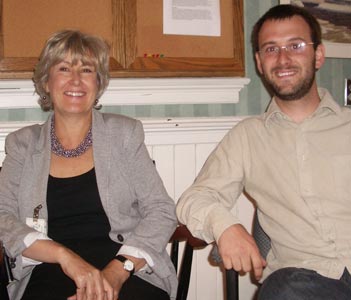New Developments in
Transplant Ethics

Linda Wright and David Rodriguez-Arias Vailhen
|
Should elective surgery patients be offered the opportunity
to donate a kidney to a patient on the waiting
list? If only 3% of patients scheduled for laparoscopic
cholecystectomy agreed to donate, the waiting list would
disappear. Since the risks of anesthesia and incisions have
already been accepted, the only incremental risk is loss
of a kidney by laparoscopic nephrectomy. Should the
donor meet the potential recipient? Should the donor
be reimbursed?
These questions, recently debated at the University of
Chicago MacLean Center for Clinical Medical Ethics,
are typical of the high voltage transplant ethics issues and
complex quandaries that Assistant Professor of Surgery
Linda Wright addresses routinely in her role as UHN
Director of Bioethics. A widely acknowledged authority
on transplant ethics, Linda receives calls from across
Canada, the US, and abroad. Should an anonymous
donor be allowed to donate against the wishes or without
the knowledge of her spouse? How should public
solicitation and internet based donation be managed
ethically? How should domino transplants be managed
to maintain confidentiality and avoid the potential problem
of donors backing out once their spouse has secured
a kidney? Should altruistic liver donors be reimbursed?
Linda and her colleagues wrote the guidelines for living
organ donors (1).
Linda began her career as a social worker in nephrology
in Montreal, gaining a large experience with the ethical
and social issues related to decisions about dialysis and
transplantation. She then began working in the heart
transplant program at the Royal Victoria Hospital. She
came to Toronto and completed her masters degree in
bioethics at the Joint Centre for Bioethics. Following a
clinical fellowship, she was appointed to the bioethics
program at the University Health Network. In addition
to her work on transplantation, the bioethics programme
works with all of the other services, teaching, developing
policy, and dealing with a wide range of issues from
innovation and research to neurosurgical interventions
to treat depression. Her work has been substantially
facilitated by the addition of Kyle Anstey, a PhD ethics
scholar trained in Australia, (http://www.jointcentreforbioethics.ca/people/anstey.shtml) and the recent arrival
from Spain of David Rodriguez-Arias Vailhen, PhD, as
an ethics postdoctoral fellow.
|
David finished his PhD in philosophy at the University
of Paris-Descartes in December of 2008. He received
a scholarship from the Spanish government offered to
post-doctoral candidates to go anywhere in the world to
study. The plan was to reduce the inbreeding in multiple
fields. David's goal is to strengthen his already excellent
English, and to gain clinical exposure. The University
of Toronto Joint Centre for Bioethics was well-known
to him by reputation. Abdallah Daar put him in contact
with Linda, a bioethicist with practical expertise in
clinical transplantation. David's thesis was a scholarly,
largely abstract work on brain death and transplantation.
David learned about Linda while studying in Cleveland;
he visited the Joint Centre after an overnight bus trip
and was attracted to the learning opportunity. He finds
their skill-sets complementary. Linda is an expert on
living donors and David on deceased donors, Linda on
practical issues and David on theoretical frameworks. He
hopes to participate as an observer in clinical consultations
and operations.
He is interested in conceptual boundaries between animal
and human, male and female, life and death, all of
which are partly objective, and partially constructed by
social factors and institutions. His philosophical interests
are in constructivism, pragmatism, and utilitarianism
- all relevant frameworks for transplantation ethics. In
the U.S. last year there was a presidential council white
paper that questioned the appropriateness of brain death
and suggested that this definition of death might be
abandoned.
The brain death construct was developed by a committee
at Harvard University that led to a bifurcated definition
of death. Cardiorespiratory death is the irreversible
loss of circulation, while brain death is the irreversible
loss of the functions of the entire brain. The committee
cited two reasons for defining brain death: 1. the burden
on the patient, family, and institution of keeping such
patients alive; 2. obsolete criteria for the definition of
death that led to controversy in obtaining organs for
transplantation. [After performing Japan's first heart
transplant, cardiac surgeon Juro Wada was arrested for
murder when he removed the heart from a "brain dead
donor", a western concept not yet accepted in Japan.]
David finds Toronto a model of integration of cultures,
far beyond anything he saw during his five years in Paris
where "there are many people from many countries,
but they are more segregated." He loves the mosaic
of Toronto where 107 languages are spoken and the
people are genuinely friendly, polite and helpful. On
his return, David will go back to teach at the University
of Salamanca, the third oldest university in the world
after Bologna and Paris. His goal is to strengthen the
connection between the University of Toronto and his
university as he has done in connecting the University of
Paris with Salamanca.
M.M.
1. Wright L, et al. Ethical guidelines for the evaluation of
living organ donors. Can J Surg. Dec. 2004;47(6):408-
413.
|